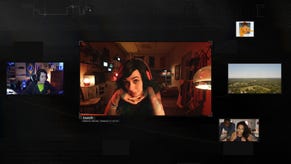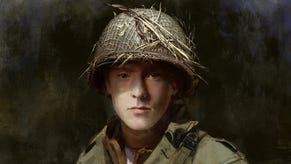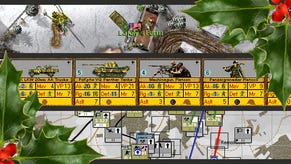His Story: What Her Story dev Sam Barlow's doing next
Implicitly choose your own adventure
"Hello," said Graham, strolling into the RPS Treehouse. "Here's a link to a seven-thousand word article which was interesting and has information about Her Story creator Sam Barlow's interactive film project. BYE!" And off he went, out of the window, diving into a leaf pile and disturbing the local hedgehogs. It was a New Yorker piece by Raffi Khatchadourian about interactive films and is a truly fascinating read if you have a few minutes free. I'll excerpt some of the bits about Barlow's project, #WarGames [official site], below, but there's a lot about scripting these kinds of narratives in the rest of the article which felt really valuable to think about.
Okay, so the idea is that Sam Barlow is working as executive creative director over at Eko (an interactive filmmaking technology company formerly called Interlude) to produce a riff on the Matthew Broderick film WarGames. The plot of that film involves a hacker breaking into a military system and playing a game which actually turns out to be warfare tech and he might end up unleashing some kind of nuclear apocalypse. Standard Matthew Broderick-in-the-eighties fare.
This game which turns out to be having real world impact feels like a decent candidate for an interactive film treatment because it contains the idea of making game-like decisions but then becoming aware of broader consequences. The mixture of viewer input and influence seems to fit with the premise whereas many other stories don't really have a non-clunky reason for interactivity. So that was the basic idea, but it has apparently since been reworked a bit, both for a more modern context in terms of the warfare involved, but also trading at least some of the explicit decision-making for implicit as the technology tries to gauge the player's interest in various elements of the story.
Here's the relevant bit of Khatchadourian's feature:
This [earlier WarGames] proposal was soon set aside, however, out of fear that toggling between a game and filmed segments would be jarring. Instead, Barlow pulled together a new pitch. Hacking was still central, but it would be explored in the present-day context of groups like Anonymous, and in the murky post-Cold War geopolitical environment: terrorism, drone warfare, cyber attacks. The story centered on a young hacker and her friends and family. Viewers would be seated before a simulacrum of her computer, viewing the world as she does, through chat screens, Skype-like calls, live streams of cable news. On a laptop, Barlow loaded a prototype: three actors chatting in separate video windows on a neutral background. With quick swipes, he moved one window to the foreground. The show's internal software, he said, would track the feeds that viewers watched, noting when they took an interest in personal relationships, for instance, or in political matters. The tracking system would also gauge their reactions to the protagonist, to see if they preferred that her actions have serious consequences (say, putting lives at risk) or prankish ones (defacing an official Web site).
"Suppose you have a significant story branch," Barlow said. "If that's linked to an explicit decision that the viewer must make, then it feels kind of mechanical and simple." In contrast, the show's system will be able to customize the story seamlessly, merely by observing what viewers decide to watch. This design acknowledged that key life choices are often not guided by explicit decisions but by how we direct our attention—as Iris Murdoch once noted, "At crucial moments of choice most of the business of choosing is already over." Before an impending story branch, for instance, the system would know if a particular viewer was interested in the protagonist's personal life, and her serious side, and could alter the story accordingly—perhaps by killing off a close relative and having her seek revenge.
It continues:
Barlow was uncertain how much of the "WarGames" tracking mechanics he should reveal to the viewer. "The two-million-dollar question is: Do we need to show this?" he said. He believed that interactive films will increasingly resemble online ads: unobtrusively personalized media. "When ads first started tracking you, for the first few months you'd be, like, 'How did they know?' A couple of months later, you'd be, like, 'Of course they knew. I was Googling baby formula.' And now it's, like, 'I'm still getting spammed for vacation properties around Lake Placid, and I'm, like, Dude, we went. You should already know!' "
That's a feeling I know very well. Google spent several months aggressively advertising ovulation kits at me before every bloody YouTube video, presumably because it was taking an educated guess at my age and gender (even though it didn't have those listed in its advertising profile for me). I also get clothing adverts following me round because I've browsed a store and I'm currently inordinately cross that it is repeatedly advertising me something I bought. I mean, if you're going to spy on me, at least do it properly. Wait... no. Please don't.
The feature then moves off to explore the idea of implicit interactivity which is, again, very interesting in terms of how it might actually let interactive storytelling go from clunky, choice-based unsatisfaction to subtle and powerful new narratives. It might also become an absolutely terrifyingly accurate way of harvesting data and pigeonholing people into prisons of their own biases. Perhaps both. Basically, it's very early days so I have no idea which bits of any of this will come to fruition but I like hearing about new ideas.
The other Sam Barlow-related snippet was about a hackathon/game jam held at Eko and his team's entry was about a man in hell trying to save his own life by playing poker.
Viewers play the role of Luck, selecting the cards being dealt—not to win the game but to alter the drama among the players. Bloch said he had cited the film in a recent presentation as a possibility worth exploring. "The expected thing in that kind of story is that you would be the guy who comes to Hell," he said. "Playing Luck—something that is more godlike—is much more exciting."
Anyway, go read the piece if you have time. I found the part about how interactive scripts need to be vague in order to work but that this can lead to some really interesting dramatic ground particularly stood out to me and I keep going back to it.








